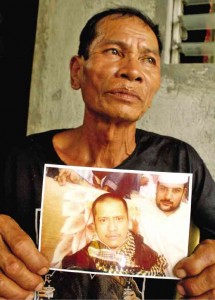Stop giving blood money, spend on defense lawyers instead—groups

HOPE Jesus Zapanta wishes that the Saudi government would give the family more time to raise the P45-million blood money that his son Joselito must pay a Sudanese family to save him from death row. E.I. REYMOND T. OREJAS/INQUIRER CENTRAL LUZON
MANILA, Philippines – As another overseas Filipino worker (OFW) faces execution in the Middle East, groups on Tuesday urged the government to increase the budget for defense lawyers instead of giving blood money.
Volunteers Against Crime and Corruption (VACC) president Dante Jimenez told Radyo Inquirer 990AM that they are against the use of public funds as blood money, in a bid to save Filipinos on death row.
The statement came two days after the deadline for Filipino murder convict Joselito Zapanta to save his life by raising P45-million in blood money lapsed.
Read: PH seeks extension for blood money
“We are in support of calls to give our OFWs the best defense lawyers…We know many are in jails because they are poor (and cannot afford) good lawyers,” Jimenez said.
Article continues after this advertisementHe said others might not agree with their stand against the use of blood money, but he explained that the VACC was “pro-death penalty when it comes to heinous crimes” and if the court has decided that the accused was guilty beyond reasonable doubt.
Article continues after this advertisementJimenez also clarified that they do not mind if the family is able to raise the funds from private donors, as opposed to government officials using public funds to also further their political career.
“Imagine the blood money is equivalent to P30 million to P40 million. Many poor Filipinos could have already benefited from that through livelihood…that amount of money to uplift themselves from poverty without resorting to crime,” he said.
On the other hand, Migrante International chairperson Garry Martinez said that while they are not against the use of blood money to save OFWs, it has become the last resort following lack of government support.
“Cases (of a number of OFWs) should not have resulted in death penalty if the government had allotted adequate budget and hired competent lawyers,” Martinez told INQUIRER.net in a phone interview.
He said the government has resorted to raising blood money just to say that they have done something for Filipino migrants.
Martinez said some accused Filipinos are also victims of injustice, having been framed up for crimes they did not commit.
He said the government should be more pro-active and immediately work on the cases of the OFWs immediately after being informed of their plight.
Migrante’s chapter in the Middle East also pointed out that “the blood money is allowed and legally accepted in the Shariah law system. And this is the only remaining option for the offender [to be saved] from death and start a brand new life.”
The group’s coordinator John Leonard Monterona said they do not see anything wrong in the use of government funds to save Filipinos who are “victims of forced migration and abusive labor environment” from death row.
He, however, added that the government should first allot funds for legal assistance and for the private sector to be more active in the campaigns to help distressed OFWs.
“Of course, it would be good if private groups and individuals contribute to the blood money…as what exactly happened with the case of Rodelio Lanuza who was released and deported last month after the Saudi King shouldered the remaining 2.3-M saudi rials out of the 3.6-M blood money asked by the aggrieved family in exchange of forgiveness in favor of Lanuza,” he told INQUIRER.net.
Migrante Middle East admitted that the justice system in the Middle East is also different from that in the Philippines.
“The basic rights of the accused to be heard and defend in court with the aid of lawyer in so many cases including that of OFW on death row Joselito Zapanta have been violated. Zapanta was not provided a local hired lawyer during case hearings, only interpreter. It was only on May 2012 when he appealed on the death verdict of Saudi’s Court of First Instance that he was given a lawyer,” Monterona said.
He said it was also because the Department of Foreign Affairs failed to provide a local-hired lawyer for Zapanta during the hearings.
Martinez said many OFWs shared the same fate and were only given pro bono lawyers by the Saudi government.
RELATED STORIES:
PH seeks extension for blood money
Saudi gov’t delays Zapanta execution